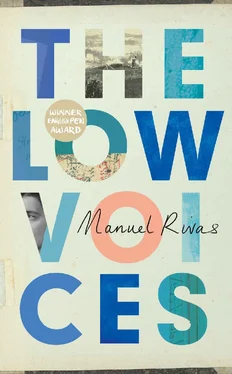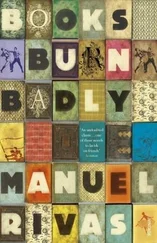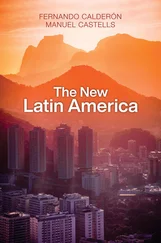Manuel Rivas - The Low Voices
Здесь есть возможность читать онлайн «Manuel Rivas - The Low Voices» весь текст электронной книги совершенно бесплатно (целиком полную версию без сокращений). В некоторых случаях можно слушать аудио, скачать через торрент в формате fb2 и присутствует краткое содержание. Год выпуска: 2016, Издательство: Harvill Secker, Жанр: Современная проза, на английском языке. Описание произведения, (предисловие) а так же отзывы посетителей доступны на портале библиотеки ЛибКат.
- Название:The Low Voices
- Автор:
- Издательство:Harvill Secker
- Жанр:
- Год:2016
- ISBN:нет данных
- Рейтинг книги:5 / 5. Голосов: 1
-
Избранное:Добавить в избранное
- Отзывы:
-
Ваша оценка:
- 100
- 1
- 2
- 3
- 4
- 5
The Low Voices: краткое содержание, описание и аннотация
Предлагаем к чтению аннотацию, описание, краткое содержание или предисловие (зависит от того, что написал сам автор книги «The Low Voices»). Если вы не нашли необходимую информацию о книге — напишите в комментариях, мы постараемся отыскать её.
A brilliant coming-of-age novel from one of Spain’s greatest storytellers,
is a humorous and philosophical take on memory, belonging, and the nature of storytelling itself.
The Low Voices — читать онлайн бесплатно полную книгу (весь текст) целиком
Ниже представлен текст книги, разбитый по страницам. Система сохранения места последней прочитанной страницы, позволяет с удобством читать онлайн бесплатно книгу «The Low Voices», без необходимости каждый раз заново искать на чём Вы остановились. Поставьте закладку, и сможете в любой момент перейти на страницу, на которой закончили чтение.
Интервал:
Закладка:
During that summer full of literature from the Far West, where was María? She really did keep to the frontier. We were palefaces, she was an Indian. At home, other, shabby-looking books started doing the rounds at night. One day, my mother opened one of those strange visitors, I remember it was Hopscotch by Julio Cortázar. She opened another, by Henry Miller. I can see her now, she read something that surprised her and then glanced at María: ‘Don’t go so fast!’ My mother believed in the power of books. She loved them and feared them. She’d read lots of lives of saints.
My father heard us talking excitedly in the middle of our misadventure. Just like Uncle Francisco. He opened the door and sent us to bed without another word. María and I never fought again. And that night we still had time to turn on the light so we could read while my father fell down exhausted on the road to Seville.
16. A Family Photo
THERE IS A family photo in the album. An official photo, so to speak. It was taken in a photo studio in Catro Camiños, in A Coruña. There are six of us — my parents and their four children, two girls and two boys. All looking very serious. In my parents, there is an expression of distrust. The camera, especially if it knows it’s being questioned, registers that feeling very well. Still today, the photo contains a vibration of impatient hostility. Of course, it was possible for us all to pose happily together for a photo. There are photos like that, at a party, some time later. But if we’re here, in the photo studio, it’s out of a sense of duty, out of necessity. In order to apply for a university grant, something María and I wanted to do, we had to enclose a photograph that showed a ‘numerous family’. I remember the day well. It was raining. My father had escaped from work and was in a hurry. He swept back his damp hair, which was a kind of time warp, in black and white.
The first family photo was taken several years earlier. One Sunday morning in summer. In Méndez Núñez Gardens, next to the monument dedicated to Concepción Arenal. A difficult place to forget, since the monument consists of a goldfish pond surrounded by thick chains, with the powerful presence of an iron eagle. It’s a public holiday. Full of light. There must have been music and tastes, but they do not form an active part of my memory. The light does, though. Everybody carries a little light with them that day. My mother, for example, wears a hat with a tulle veil. She’s the one who takes the initiative when the photographer appears. Yes, we’ll have our photograph taken. Finally. My mother gathers us together. Tells us to pose. It’s a shame we don’t have a good portrait of the whole family. So it’s not only an act of happiness, it’s also a responsibility. An account that has to be settled with destiny. She positions us. Glances around. The final touch. That’s it. Attention please!
Motionless. All of us looking towards the photographer. He’s a fat man. Almost as wide as he is tall. He bears a certain resemblance to Oliver Hardy. He wipes his resinous brow with a handkerchief. He seems to be involved in a conflict with his body and clothes. A disaffected suit, too long or too short, who knows? He struggles with the knot in his tie. Stands up. Breathes. Stares. Examines, blinks, clicks his tongue. During the preparations, we remain very still, mute, with the complex of a group that doesn’t fit. Eventually, he prepares the flash. Gestures with his left hand. Last warning. Looks through the viewfinder. Moves his right foot forward. Sways slightly, bends his knees. This position gives the man back a little symmetry.
‘Smile!’ he shouts. ‘It’s not a funeral!’
He jots down his address on the page of a notebook. He looks tall now. My mother searches in her bag for her purse. Opens it and takes out the money. These are two laborious, semi-secret operations. My father stands apart, his hands in his pockets. It’s Sunday. The photo will be ready on Tuesday afternoon, no doubt about it. So there we are on Tuesday afternoon, accompanying my mother. No, my father is not part of the procession. He works as a builder all day. And sometimes as a musician at night. The address is in the area around Santa Lucía Market. We reach an alleyway. My mother checks the number on the piece of paper and knocks at the door. There is no answer. Nobody appears. She knocks louder. In the house opposite, an old woman opens the shutters on the first floor.
‘Who are you looking for?’
‘A photographer, madam! Is there not a photographer living here?’
The old woman closes the window with a mournful silence.
We went back another two or three times. But no. There was no photographer and nobody opened the window. On Sundays, my mother would carefully peruse the gardens. Pay attention to anybody with a camera. Yes, that one’s fat. But people change, they have their right side and their wrong side. One day, she saw him — or thought she saw him — in the group next to the tombola. She ran after him. Cleared a way through the crowd. But the fat man had the speed of light. I sometimes think he’s the one passing by when a man in a suit or overcoat suddenly overtakes me. Hefty, with long strides, fading out of sight. I imagine him going to his real home. Putting down the crippled camera. Opening a darkroom with all the golden memories of all the photographs he never took. There we are, smiling, as united as ever.
17. My Mother and the Manifesto of Surrealism
CONCENTRIC CIRCLES WERE perhaps the first writing in Galicia, together with labyrinths and representations of deer. I say ‘writing’ because they are, without a doubt, signs telling a story in stone, a flint burin in the granite notebook at the mercy of the elements. Astral calendars, liturgical symbols, maps or primitive censuses? There they are, a circular psyche, a cyclical look interweaving time and timelessness. They’re good for thinking and imagining, these petroglyphs that date back to a period known as human prehistory, but constitute a masterful period in the history of the line. What we can say is that their authors were good calligraphers, had ‘good handwriting’, a desire for style, and control over their drawing, the most remarkable feature of which is the extreme simplicity that contains endless information.
This is what my mother’s mouth looks like.
I cannot reproduce fragments of my mother’s soliloquies. Needless to say, she only ever talked to herself when she was alone or in the presence of a close relative she assumed was immersed in their own work. María and me, for example, doing our homework. From time to time, the murmur of my mother’s stream of consciousness would grow louder, accelerate, even unfold or diverge into different voices that would sometimes argue vociferously with each other. This happened a lot in what might be called ‘places of water’. At the kitchen sink or at the place for washing clothes, which might be the local river or the basin my father ended up installing next to the whimsical well. He dug that well for years. He would resume his work every summer, when the well dried up. Until he came across another of those ‘false springs’ that deceived him and filled him with hope. In this way, he got down to fifteen metres, when his figure would be swallowed up by blackness and he thought he had finally reached the end. Confronted water’s Alzheimer’s. The story of that well was the story of a failure. He had built a void. He had also built a desire. I always approached that well with shame and resentment. But now I see it as the mouth of literature. I see my father silently digging or dynamiting stones and language in search of his own stream of consciousness.
At the kitchen sink, in the rotating action of hands doing the dishes or the movement of washing in the river, my mother talks to herself in suspense. She murmurs, shares secrets, furiously replies to an impertinence or question. There are times it would have been very interesting to know who she was talking to. There was one particular situation that transformed her whole body. An extreme case of metamorphosis. The rage brought on by injustice. She was never violent, she was well mannered, gentle in speech, of a sunny disposition. But I remember her once in an office of the town hall, tired of being mistreated, swearing she would come back with a rock like the one María Pita threw at the pirate and admiral, Francis Drake. So here is my mother, talking to herself. Her face changes. She grows hot, laughs, her eyes become all atmospheric. They glint, cloud over, flash, remain in misty suspense. All of this has to do with words. There’s something going on in the kitchen. I look up from my book or exercises and stare at her, simultaneously amazed and disturbed, not daring to interrupt. If she’s opening up like this, it’s because she’s possibly in a landscape of confidence. I cannot recall what she was saying, probably because at the time I was more concerned with the expressive phenomenon than with the expression itself. My memory is made up of remnants, beads of language that go forwards and back, rotating.
Читать дальшеИнтервал:
Закладка:
Похожие книги на «The Low Voices»
Представляем Вашему вниманию похожие книги на «The Low Voices» списком для выбора. Мы отобрали схожую по названию и смыслу литературу в надежде предоставить читателям больше вариантов отыскать новые, интересные, ещё непрочитанные произведения.
Обсуждение, отзывы о книге «The Low Voices» и просто собственные мнения читателей. Оставьте ваши комментарии, напишите, что Вы думаете о произведении, его смысле или главных героях. Укажите что конкретно понравилось, а что нет, и почему Вы так считаете.












